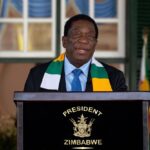Zimbabwe’s August 23 and 24 harmonized elections have been deemed not credible by the European Union Election Observer Mission (EU EOM).
The EU EOM highlighted numerous anomalies, including the curtailment of rights and a lack of a level playing field, which compromised the integrity of the electoral process.
Although invited by the government to observe the polls, the EU mission encountered significant challenges in engaging with national officials, such as the Zimbabwe Electoral Commission (Zec), whom they were only able to meet once. In its final report on the plebiscite, the EU revealed that citizens faced severe restrictions due to the shrinking space for civic activities.
The report stated, “The August 23, 2023 harmonised elections in Zimbabwe were marked by a curtailment of rights and freedoms and the lack of a level playing field, which limited voters’ ability to make their choices in a genuinely free and pluralistic environment.” It further highlighted a palpable fear of violence throughout the electoral process, with a climate of retribution emerging after the elections.
The EU EOM’s findings aligned with the final report of the Southern African Development Community Election Observation Mission (Sadc EOM), which also concluded that Zimbabwe’s polls fell short of internal, regional, and international standards.
The campaign environment leading up to the elections was described as subdued but tense, characterized by instances of violence, intimidation, and limitations on the freedom of assembly. The EU EOM report noted that many observers received reports of Forever Associates Zimbabwe (FAZ), an affiliate of the ruling party Zanu PF, actively intimidating voters, particularly in rural areas. FAZ, led by Brigadier-General Walter Tapfumaneyi, a co-deputy director-general of the Central Intelligence Organisation, has been accused of ensuring President Emerson Mnangagwa and his party’s victory.
Furthermore, the EU expressed concerns about the lack of independent verification of the election results. The absence of publicly available data disaggregated by polling stations and the undermining of sample-based projection of results conducted by citizen observer groups hindered the verification process.
The election day itself witnessed a troubling incident when armed police stormed the offices of the Zimbabwe Electoral Support Network (Zesn) in Harare. The police arrested 40 election monitors and seized computers and other election-related materials being used by the poll watchdog to track the election.
While acknowledging that the technical implementation of the electoral process largely adhered to the electoral calendar until election day, the EU report highlighted a lack of guarantees for independence, transparency, and significant delays in opening a considerable number of polling stations. These factors eroded public trust in Zec and the efficiency of electoral preparations. Throughout the electoral period, Zec’s activities were criticized for their lack of transparency and insufficient communication.
In the post-electoral environment, the human rights situation further deteriorated, with crackdowns on civil society and the targeting of human rights defenders and opposition figures. Zimbabwe has seen a surge in politically-motivated abductions, enforced disappearances, and the murder of opposition members since the August polls.
The EU emphasized the necessity for comprehensive and meaningful reforms and the political will of Zimbabwean authorities to engage in such reforms to pave the way for genuine and credible elections in the future. The EU proposed 21 recommendations, including ensuring that Zec and its staff can operate without political influence at all levels.
As a consequence of the disputed polls, the EU has suspended the US$5 million funding that had been extended to Zec.
Moving forward, it remains crucial for Zimbabwe to address the concerns raised by international observers, strengthen democratic processes, and protect human rights to foster an environment conducive to free and fair elections.












